Answer these simple questions and we will find you the BEST prices
Which type of solar quotes do you need?
It only takes 30 seconds
100% free with no obligation

Get Free quotes from loft conversion specialists near you

Save money by comparing quotes and choosing the most competitive offer

The service is 100% free and with no obligation
- GreenMatch
- Loft Conversion
- Solar Panels on Loft Conversion
Solar Panels on Loft Conversion: Are They Worth It?

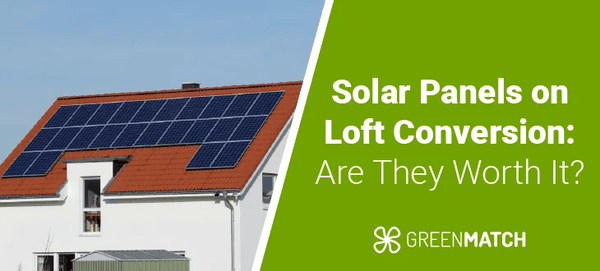
- Solar panels cost £5,000-£8,000 for a typical UK home.
- With solar panels, you can save between £270 and £640 annually on energy costs.
- Adding a solar battery reduces electricity bills by up to 70%, boosting your home's efficiency year-round.
- Solar panels can increase home value by up to 4%, appealing to energy-conscious buyers.
With energy prices climbing, homeowners are increasingly drawn to solar panels on loft conversion—but is it truly worth adding them to your loft conversion?
While the promise of lower bills and a reduced carbon footprint is enticing, the investment can be significant, and the setup might not suit every home.
In this guide, we’ll explore the financial and environmental gains you can expect, along with any potential drawbacks. Discover whether solar panels are the right choice for your loft conversion and how they could transform your home’s energy profile.
Interested in a loft conversion? We can help you get the best deal!
Don’t waste hours contacting installers on your own. Simply fill out our 30-second form, and we’ll do the rest. We’ll connect you with up to 3 trusted installers near you for free, no-obligation quotes.
Click below to get started.
- Describe your needs
- Get free quotes
- Choose the best offer
It only takes 30 seconds



Benefits of solar panels on a loft conversion
Installing solar panels on your loft conversion offers several tangible benefits, including energy savings, increased property value, enhanced Energy Performance Certificate (EPC) ratings, and greater energy independence.
Let’s review each of these benefits in more detail.
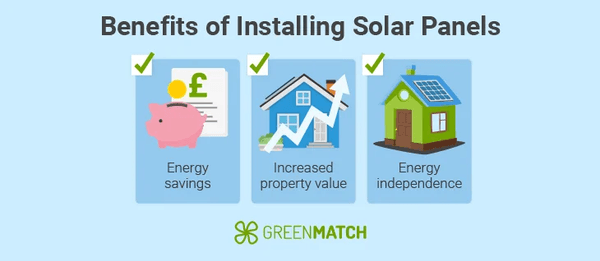
Energy savings
Solar panels can significantly reduce your electricity bills by generating renewable energy on-site. On average, UK households can save between £270 and £640 annually with solar panels. The exact savings depend on system size, panel efficiency, and household energy consumption.
Here’s a breakdown of potential annual savings:
| Solar system size | Annual energy savings (approximate) |
|---|---|
| 2.1 kWp | £272.67 |
| 3.5 kWp | £454.45 |
| 4.9 kWp | £636.23 |
Increased property value
Solar panels can add substantial value to your property. Homes with solar installations are often valued up to 4% higher, translating to about £11,500 on an average UK property priced around £287,000. This increase is particularly attractive to eco-conscious buyers who value energy efficiency and lower energy bills.
Beyond immediate value, solar panels also improve your home’s Energy Performance Certificate (EPC) rating. A higher EPC rating signals better energy efficiency, reducing annual energy costs and increasing appeal in the housing market. In competitive areas, an improved EPC can set your property apart, as buyers may prioritise homes that promise long-term energy savings and align with environmental goals.
Moreover, government incentives for energy-efficient homes, including green mortgages, continue to expand, making properties with solar panels even more attractive. This broader appeal can boost demand and increase your home’s market value across various buyer segments.
Energy independence
By producing electricity on-site, solar panels lessen your dependence on the national grid. This means you’re not as vulnerable to fluctuating energy prices or potential power shortages.
During peak times or price hikes, your solar system continues to provide free energy, which can reduce your utility bills even further.
Over time, this energy independence not only stabilises household expenses but also allows you to enjoy a self-sustaining, eco-friendly lifestyle that aligns with a future of renewable energy.
Disadvantages of solar panels on a loft conversion
While adding solar panels to a loft conversion offers substantial benefits, there are a few potential drawbacks to consider:
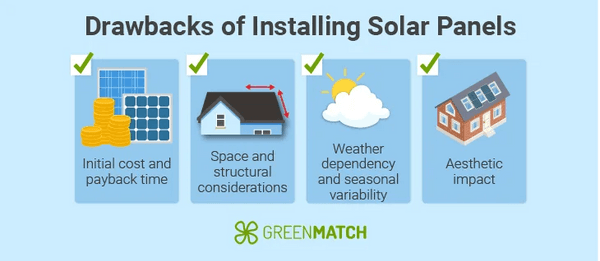
1. Initial cost and payback time
Installing solar panels requires a significant upfront investment. The average cost of solar panels for a UK home can range from £5,000 to £8,000 for a standard 3kW to 4kW system.
Though the long-term savings are considerable, it may take 10–15 years to recover the initial costs through energy savings. For some homeowners, this payback period can be a disadvantage, especially if they plan to sell the property in the near future.
2. Space and structural considerations
Solar panels add weight to the roof, which may require additional structural support, particularly if your loft conversion involves major modifications. Reinforcing the roof to accommodate solar panels can add to the project’s complexity and cost.
Additionally, limited roof space may restrict the number of panels you can install, potentially reducing the system’s energy production and savings.
3. Weather dependency and seasonal variability
Solar panels generate electricity based on sunlight exposure, meaning that their efficiency can vary with weather and seasons.
In the UK, shorter winter days and frequent cloudy weather can reduce the panels’ output, affecting your energy savings. While solar panels still produce energy on cloudy days, their output can be lower, meaning your reliance on the grid may remain higher in certain seasons.
4. Aesthetic impact
For some homeowners, the look of solar panels can be a concern, especially if the loft conversion is highly visible. Solar panels can noticeably alter your roof’s appearance, which may not suit traditional or historic homes.
In conservation areas or on listed buildings, installing panels may require special permissions, or may be restricted.
To keep panels discreet, consider roof-integrated options that sit flush with the roof, minimising visual impact. Consulting with an installer familiar with aesthetic considerations can help ensure the best match for your home and neighbourhood.
Despite these potential drawbacks, for many homeowners, the benefits of energy savings and increased property value can outweigh the disadvantages. However, it’s crucial to assess your individual circumstances and consult with professionals to ensure solar panels are the right choice for your loft conversion.
Trying to find local loft conversion installers on your own can take hours of unwanted hassle.
Luckily, we can connect you with up to 3 local installers for free! Just fill in our 30-second form, and we’ll do the rest.
Click below to get started!
- Describe your needs
- Get free quotes
- Choose the best offer
It only takes 30 seconds



Are all loft conversion types suitable for solar panels?
Not all loft conversions provide the same conditions for installing solar panels, and the design of your conversion can impact both the feasibility and efficiency of a solar panel system.
Here’s how different types of loft conversions measure up when it comes to solar compatibility:
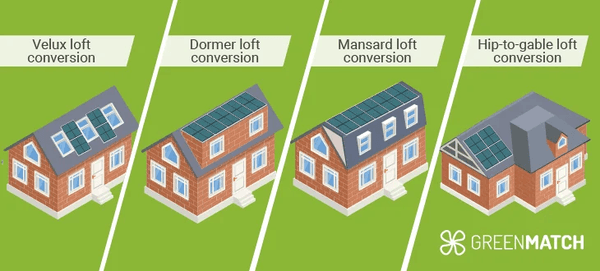
Velux conversions: Add roof windows without altering the roof’s structure, which keeps the ideal angle for solar panels. However, large Velux windows may reduce roof space, so careful panel placement is essential to avoid shading.
Dormer conversions: Add vertical roof extensions, increasing space for solar panels on the surrounding roof. Proper planning is needed to prevent shading, but a solar panel on a dormer loft conversion layout can often accommodate multiple units effectively.
Hip-to-gable loft conversion: Replaces one sloping roof side with a vertical wall, creating more space for panels on the gable or remaining roof slopes. Best suited for detached or semi-detached homes with ample roof space.
Mansard conversions: Create a nearly flat roof section, but the angle may limit sunlight capture in the UK. These often require planning approval, and panel placement can be challenging due to the roof’s structure.
Flat roof loft conversions: These are often added to homes with existing flat roofs or extensions, typically requiring wall extensions or structural supports for stability. Solar panels on flat roof loft conversion can be installed at an angle on flat roofs for optimal sunlight exposure.
If you're uncertain about the best loft conversion type for solar panels, here are some pointers to help narrow down your options based on specific needs:
- Maximising roof space: If you want maximum space for solar panels, a dormer or hip-to-gable conversion could work well. Dormers extend the roof vertically, leaving plenty of surrounding roof space, while hip-to-gable conversions add a flat gable end that’s great for panel mounting.
- Minimising structural changes: If you want a simpler conversion without major structural changes, Velux or dormer conversions may suit you best, as they often need less reinforcement than more complex types like mansard.
- Aesthetics and permissions: If you’re in a conservation area or want minimal visual change, a Velux conversion is less noticeable from the exterior. Mansard conversions, while stylish, may need permission for loft conversion and can alter the roof’s look significantly.
- Budget constraints: If budget is a factor, simpler conversions like Velux or small dormers can be more cost-effective while still allowing for solar panel installation.
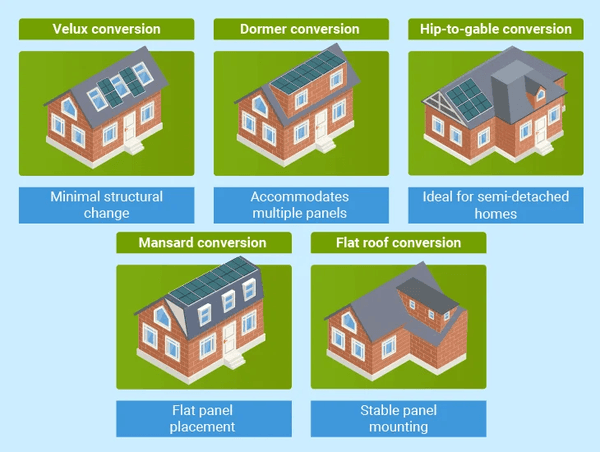
How to install solar panels on a loft conversion?
Installing solar panels on a loft conversion is not a DIY job—it requires professional installation to ensure safety, efficiency, and compliance with regulations.
This professional process involves a few essential steps:
- Site assessment and design: A professional assesses your roof's structure, orientation, and sunlight exposure to determine the optimal panel size, type, and placement.
- Planning and permissions: Check with local authorities for any planning permissions, especially in conservation areas or for complex loft designs like mansards.
- Structural reinforcement: In some cases, your roof may need reinforcement to support the panels' weight and withstand weather.
- Panel mounting and wiring: Technicians mount the panels on brackets at the ideal angle for sunlight, connect wiring through your roof, and link it to an inverter that converts solar energy into usable electricity.
- Testing and activation: Once installed, the system is tested for efficiency and safety, then connected to your main power supply.
Are solar panels on loft conversion worth it?
Adding solar panels to a loft conversion provides clear environmental and financial benefits. Solar panels with loft conversion generate renewable energy, reducing your carbon footprint and greenhouse gas emissions. Financially, they can save you £300 to £500 annually on electricity bills while increasing property value and boosting your EPC rating—appealing to potential buyers.
Solar power also gives you energy independence, shielding you from rising energy costs and supporting a sustainable lifestyle.
To maximise your return on investment for loft conversion with solar panels, consider working with reputable professionals for installation.
Take the next step toward an energy-efficient loft conversion—fill out a quick form to receive up to 3 free loft conversion quotes from local installers. Compare options and choose the best solution tailored to your needs.
Click below to begin!
- Describe your needs
- Get free quotes
- Choose the best offer
It only takes 30 seconds



FAQ
Yes, solar panels can be installed on most types of loft conversions, provided there is sufficient roof space and sunlight exposure.
Yes, solar panels can be installed around dormer structures. However, careful planning is needed to ensure the dormer doesn’t cast shadows on the panels, which could reduce efficiency.
In most cases, planning permission isn’t required. However, listed buildings or properties in conservation areas may need special approval.
Yes, solar panels can work well on a flat roof. They’re typically mounted at an angle for optimal sunlight exposure and can be an efficient choice if roof space allows.

Tania is an experienced writer who is passionate about addressing environmental issues through her work. Her writing aims to shed light on critical environmental challenges and advocate for sustainable solutions.
We strive to connect our customers with the right product and supplier. Would you like to be part of GreenMatch?

Stay up to date with energy saving tips and grant alerts
Receive offers, marketing and promotions via email from Leads.io about GreenMatch and our brands/partners to help you save.
Thank you for subscribing to our newsletter!
Your email has been successfully added to our list. We look forward to sharing our latest updates with you soon!
